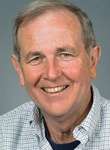Joe Burns elected next dean of university faculty
By Susan Kelley

Joseph A. Burns, the Irving P. Church Professor of Engineering and professor of astronomy, has been elected the new dean of the university faculty for a three-year term. He will succeed William Fry, professor of plant pathology, who will step down June 30 after serving since 2008.
Of the 2,051 faculty members (including emeritus professors) who were eligible to vote, 52 percent participated in the election between Burns and Risa Lieberwitz, professor of labor and employment law.
"I am honored and also humbled to have been elected by such a large number of my colleagues to represent their views and to speak for them to the administration and to the Cornell University Board of Trustees," Burns said. "I believe that the large turnout signals a growing faculty engagement in the question of what Cornell will be in the 21st century. These are exciting times for Cornell, and I'm delighted to be able to play a role in helping our community move forward."
The dean represents and advocates the interests of the faculty to Cornell's president, trustees and general community, and assists the faculty and the Faculty Senate in formulating judgments on questions of concern to the faculty.
Burns' election is subject to confirmation by the board of trustees. The Faculty Senate can extend the dean's term for no more than two years.
One of his goals as faculty dean is to strengthen the dialogue among the faculty, administration and trustees that has been established by recent deans, Burns said. "Recently President David Skorton and Provost Kent Fuchs have increasingly sought faculty advice on issues of importance; I only hope that this involvement continues over the next few years.
"Simply put, I want to see Cornell come out of these turbulent times as a stronger institution, one that continues to carry out teaching and research on a global stage and with distinction. To accomplish this will require judiciously replacing an aging faculty with the best talent available, securing necessary financial support for undergraduates and graduate students, improving our research laboratories and libraries, and re-emphasizing Cornell's land-grant [mission]. The CornellNYC Tech campus provides us with an unparalleled opportunity to extend the university. The administration, board, students and faculty must work together to accomplish great things."
Burns has four close family members with degrees from five different Cornell colleges. "Having been a student, a faculty member, a parent and a reluctant administrator here, I feel that I understand Cornell's breadth and value, and its strengths and weaknesses," he added.
Burns has been a faculty member for more than 40 years, having joined the Department of Theoretical and Applied Mechanics in 1966. (The department merged with the Department Mechanical and Aerospace Engineering in 2009).
His academic research concerns the solar system's exploration; this currently means planning and analyzing spacecraft images of Saturn and its rings. He has served on several advisory panels for NASA and the National Research Council, where he led the first decadal survey of planetary science. A former vice president of the American Astronomical Society, he has received five NASA achievement awards for his research.
Burns has taught sophomore courses in fundamental engineering subjects, mathematics, astronomy and physics, as well as graduate courses in dynamics, planetary science and applied math. He received the College of Engineering's Robert '55 and Vanne '57 Cowie Excellence in Teaching Award in 2010.
He served as vice provost for engineering and physical sciences 2003-07 and chaired the Department of Theoretical and Applied Mechanics 1987-92. Burns also leads the Natural Sciences/Engineering Committee in planning Cornell's sesquicentennial celebration.
Media Contact
Get Cornell news delivered right to your inbox.
Subscribe